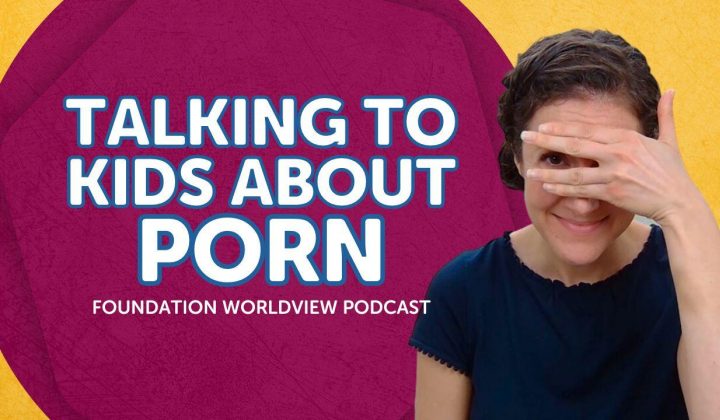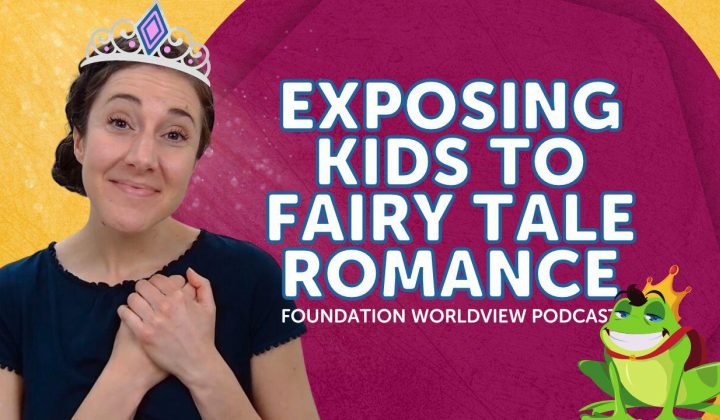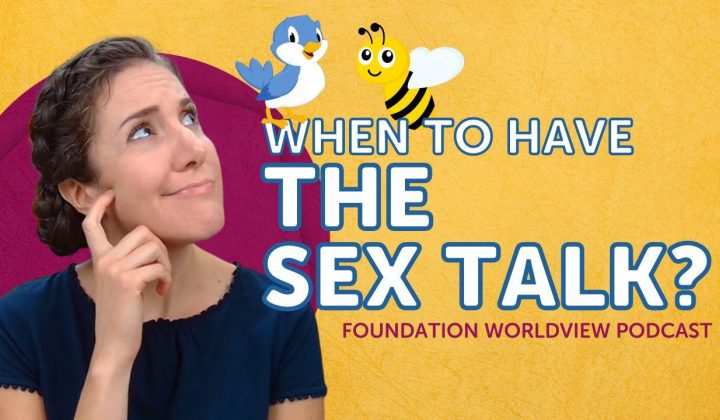Learn more about the journey that led to us equipping kids to carefully evaluate every idea they encounter.
Meet members of our team who have contributed to curriculum development.
Hear from real users of the Foundation Curriculum.
Learn what we believe about God, Jesus, Scripture, and more.
Talking to Children about Evil and Tragedy in the World
Today's question says, "With all of the school shootings and other evil things that happen around us, how do you recommend talking with children about them? What age do you think is appropriate and how do you best frame this to point to God?"
Resources Mentioned
Transcript
Note: The following is an auto-transcript of the podcast recording.
Hello friends, and welcome to another episode of the Foundation Worldview Podcast where we seek to answer your questions so that you can equip the children that God has placed in your care to carefully evaluate every idea they encounter and understand the truth of the biblical Worldview. I'm your host, Elizabeth Urbanowicz, and I'm thrilled that you've joined me for another episode today. Today's question says, "With all of the school shootings and other evil things that happen around us, how do you recommend talking with children about them? What age do you think is appropriate and how do you best frame this to point to God?" Such important questions to think through today.
Before we dive down deep into these questions, I would ask that if you have found the content of this podcast beneficial that you would consider liking and subscribing and also that you would consider writing a review so that more people can find this content. If you have a question that you would like me to answer on a future Foundation Worldview podcast, you can submit that question by going to FoundationWorldview.com/podcast.
Now, these are really good questions for us to think through as we just know that our world, we live in a world that is fallen. On this side of Genesis 3, there is horrendous evil that takes place in our world, and we know that that evil is not just out there, but the evil is also within our own human hearts. And so there is no way that we can hide our children from the tragedies that happen in this fallen world. Now, as this questioner has suggested, we do need to wisely consider how and when to present such tragedies to our children, but if we are just hiding such events from our children, what we're doing is we're actually crippling them in the long run. Because we live in a fallen broken world.
We live on this side of Genesis 3 when we have all inherited a sin nature and we live on the ground that has been cursed and is just groaning, waiting for the appearance of the sons of God, waiting for Jesus to come back and make all things new. And we need our kids to have a realistic picture of what it looks like to live life in this fallen broken world. So the first thing that I recommend is that we just have general discussions with our kids about why bad things happen - why there is evil in the world. And now the questioner has asked, "what age do you think is appropriate?" I think from the age of three on up, having the conversation about why God allows evil is really important because we know that evil does occur. We know that we ourselves are sinful and fallen, and we know that we live in a broken, fallen world.
So to have these conversations with kids. I highly recommend you check out a book club month that we recently had. We had a month where all of the books that we recommended at the Foundation Worldview Book Club were on the topic of why God allows evil. So we'll put a link to that book club in the show notes. We recommended three books in that month for adults. We recommended the book, 'Why Does God Allow Evil' by Clay Jones. For eight to 12 year olds, we recommended the book, 'Why Does God Let Bad Things Happen' by Chris Morphy. And for kids four to seven, we recommended the book 'Fox and The Hard Day' by JD Kalinga. And then we have questions to go through with those two books for kids to guide you as you have these conversations with your children.
We also do have a blog series on Foundation, the Foundation Worldview blog that's called 'Mommy Why Does God Let Bad Things Happen' that just takes you through some answers to these deep questions about why God allows evil. So highly recommend even before you're talking about a national or global or personal tragedy, that you set up this framework for understanding the presence of evil in our world.
And so those three books that I just recommended as well as the blog series on Foundation Worldview are a great way to start having that discussion with your children and recommend, you know, even from the ages of three and four that you start having these conversations. Then as tragedies occur, as national or global tragedies or even personal familial tragedies occur, that you do discuss them with your kids.
And now one of the greatest ways to do this is to actually pray for those who have experienced these national or global tragedies to bring our kids before the throne of God and to pour out our hearts before the Lord and to pray for the victims of such tragedies because this is a way to help our children, even our little ones understand that what happened was really bad, it was wrong, it was evil, and there are victims and there are people who God, who God even mourns for, that we are living in this broken fallen world and that God does care for those people.
In fact, He cares for those people so much that He made the ultimate sacrifice by giving His Son so that we can have true life, new life in Him, that we can be reconciled to Him. So that was the first, that's the thing I recommend that we pray with our children for the victims of different tragedies. Now, the way in which we present the tragedies to our kids is going to look different at different ages. When there's a school shooting and we're talking to kids, eight on up, we're probably going to give more details. A man or a woman, whoever it was, went into the school with a gun and they shot these children and these teachers and can actually talk through those things with our kids. With kids seven on down, we're probably just going to say, "yeah, there was someone who went in and they actually killed people in a school.
And it's very, very sad because the families of those people miss them so very much." And so we're going to explain it in different language to different kids, but they're going to need to have some semblance of an idea of what happened, and then we'll pray for the victims. Then we can thank God for the hope of eternity that we're turning back and we're looking at the grand scope of history that this is a terrible tragedy. It's something that we should mourn. It's something that we should grieve over. We should pray for the victims, and we should also thank God for the hope of eternity with Him because God holds all of our tears in a bottle, but one day there will be no more tears because God is going to come and He's going to make a new heaven and a new earth, and those who have repented of their sin and trusted in Jesus will live with Him forever in this new heaven and new earth.
Okay, so that's what I recommend, explaining these things in simple terms to kids, praying for the victims and thanking God for the hope of eternity so that we're looking at the whole scope of reality. And then when these national tragedies do happen, we can circle back to discuss 'why is it that God allows evil?' So this is why I say beforehand, before we discuss such tragedies, we need to build this foundation with our kids in a great way to do so is with those books that I recommended. So then we can circle back around that when a tragedy does happen, we can anchor that and 'okay, why have we already learned that evil occurs in our world?' And then as we're thinking through the different children that God has placed in our care, different kids are going to react different ways to different situations.
So it's important for us that as we present such tragedies to our children, whether they're global or national or very personal, familial tragedies, that we're asking our kids how they're feeling that we're not just dumping the weight of this evil, this sin on them, but that we're helping, we're helping them understand what they're thinking and feeling and how to process these things because we need to equip our kids to process these things in a biblical way. So a great time to do this - I'm not talking about the tragedies - but a great time to follow up with our kids to ask how they're feeling is at bedtime. Usually at bedtime, there's just something special about bedtime. I don't know if it's just that kids are wanting to stay up later and start conversations, or if they just feel like they need to unburden themselves before they end the day.
But bedtime is a time when kids are usually much more open to having deeper conversations. And so we can ask them "you know, today, we talked about this school shooting or this earthquake or this war, and then we prayed for the people that are experiencing that. How are you feeling about that? What are your thoughts and your feelings about that?" And giving our children an opportunity to share with us how they're feeling so that we can help them bring those feelings before the throne of God and see everything through the lens of the biblical worldview.
This is where it's really important that you know your child well, that you know may have a child that's going to spill out everything he or she is thinking and feeling immediately. Or you may have a child who is more introspective and is going to need a little bit more drawing out. I know that when I was growing up, I was very much introspective and it took me a long time to really share what I was thinking and feeling. And in some ways, it even now as an adult, I'm not someone who very quickly shares what I'm thinking and feeling with others. I really need to be more drawn out. And so if we have a child who we know is a really deep thinker and feeler and they're more internally processing things, we might need to ask different questions. We might need to ask more questions than just, "how are you feeling about that?" We might ask, "what are some of the thoughts that you thought when we talked about this? Does this make you scared?" We can give them words. "Does this make you scared? Does this make you angry? Does this make you nervous? How does this make you feel?" And then circling back to bringing it back to the biblical worldview and the hope that we have in Christ.
I really loved this question because I think it's so important that we are making sure that we are equipping our children with the skills that they need in order to live in a fallen world and understand the truth and the goodness and the beauty of the gospel of Jesus Christ.
Well, that's a wrap for today's episode. But as always, as we leave our time together, my prayer for you is that no matter the situation in which you and the children in your sphere of influence, find yourselves, you would trust that God is working all things together for your good by using all things to conform you more into the image of His Son. I'll see you next time.
Related Posts and insights

How To Talk To Kids About Porn
In this episode of the Foundation Worldview Podcast, host Elizabeth Urbanowicz discusses the crucial topic of when and how to start talking about pornography with our kids. The episode covers important aspects such as being proactive in addressing the issue, understanding what children are exposed to, and building a positive biblical foundation for human dignity and God's design for sex and sexuality.

Exposing Kids to Fairy Tale Romance
Today's question says, "Is there a connection between introducing romance, even innocent romance, in movies and books at a young age, ie Disney animated movies, et cetera, and a child's interest in romantic relationships, dating, sex, or porn?"

When To Have The Sex Talk?
How should you have the sex talk with your son or daughter? Do you talk to them individually or as a group? This episodes takes a look at the goals behind the sex talk and provides tips to have this conversation with your child. We also include information on resources that are available to help parents talk to their kids about sex.





